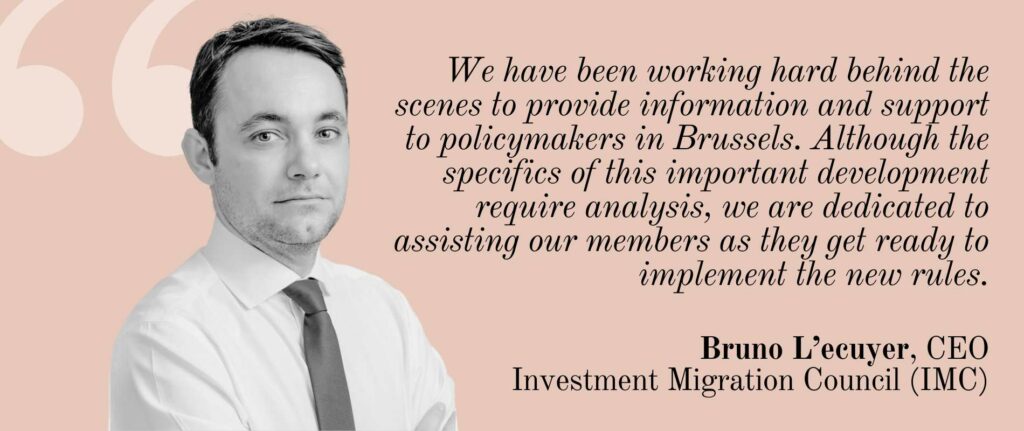The new EU anti-money laundering rules, which industry experts consider an implicit acceptance of Investment Migration (IM), will have an impact on IM operators within and outside the EU.
On 30th May 2024, the European Council approved a comprehensive legislative package targeting anti-money laundering (AML) and countering the financing of terrorism (CFT). These regulations mark a significant shift for the investment migration (IM) industry, now brought under the regulatory umbrella. The implications, spanning from political to reputational, are profound, with ripple effects extending to third-party stakeholders with vested interests in the European Union (EU).
Investment Migration (IM) Operators Now Obliged Entities
As announced earlier by IMGW News in the article entitled EU Set to Tighten AML Rules on Investment Migration by Summer 2024, the latest EU anti-money-laundering rules (AMLD6) will now include “investment migration operators” as new obliged entities.

IM operators, who provide services to third-country nationals seeking residency rights in exchange for investments, will now be subject to stringent AML/CFT obligations. This move aims to ensure the legitimacy of funds and investments and prevent the misuse of IM programmes for illicit purposes.
Key Legislative Changes
The legislative package comprises three pivotal texts directly influencing the IM sector: the AMLA Regulation (AMLA-R), the Anti-Money Laundering Regulation (AMLR), and the 6th Anti-Money Laundering Directive (AMLD 6). These regulations introduce tighter controls, stricter oversight, and a new EU enforcing body, reshaping the operational landscape for IM stakeholders.
Implementation Timeline
Following publication in the EU Official Journal between June and July 2024, the regulations will progressively come into force. Notably, AMLA-R will become operational on 1st July 2025, with AMLR and AMLD 6 following suit shortly after.
In response to this development, Bruno L’ecuyer, Chief Executive of the Investment Migration Council (IMC), commented when contacted by IMGW News, saying, “We have been working hard behind the scenes to provide information and support to policymakers in Brussels. Although the specifics of this important development require analysis, we are dedicated to assisting our members as they get ready to implement the new rules.”
Founded in 2014, the IMC serves as the global hub for investment migration, uniting key players in the industry. The IMC establishes international benchmarks, offers certifications, and produces valuable research in the investment migration sector for the benefit of governments, policymakers, international organizations, and the general public.
Political Dynamics
The journey towards these regulations underscores nuanced political dynamics. The European Commission’s scrutiny of IM programmes, alongside the European Parliament’s resolutions, reflects a push for regulatory action. However, the recognition of residency-by-investment (RBI) programmes while respecting member state sovereignty signals a delicate balance between regulation and national prerogatives.
The regulations introduce a framework aimed at harmonising AML/CFT rules, enhancing oversight, and imposing obligations on IM operators. From empowering the newly established AMLA to specifying due diligence requirements, the policy implications are far-reaching.
Impact on Third Countries
Third countries are urged to align with EU standards to facilitate smoother economic interactions. Failure to adopt similar measures may strain economic and diplomatic ties with the EU, underscoring the need for proactive engagement.
Navigating Compliance
While the regulations enhance industry legitimacy, smaller IM intermediaries may face disproportionate compliance burdens. Collaboration, best practice sharing, and training emerge as vital strategies for industry resilience.
The changing regulatory environment poses challenges and opportunities for the investment management (IM) industry in the EU and in countries seeking access to the EU market. While strict regulations may discourage some, adherence to stronger anti-money laundering (AML) standards improves the industry’s credibility and fosters greater acceptance within the EU.
If you interested in this subject, we invite you to refer o the following IMGW artcles, please:
- Updated: EU vs. Malta Citizenship by Investment Programme Hearing Scheduled for 17 June
- EU Set to Tighten AML Rules on Investment Migration by Summer 2024






